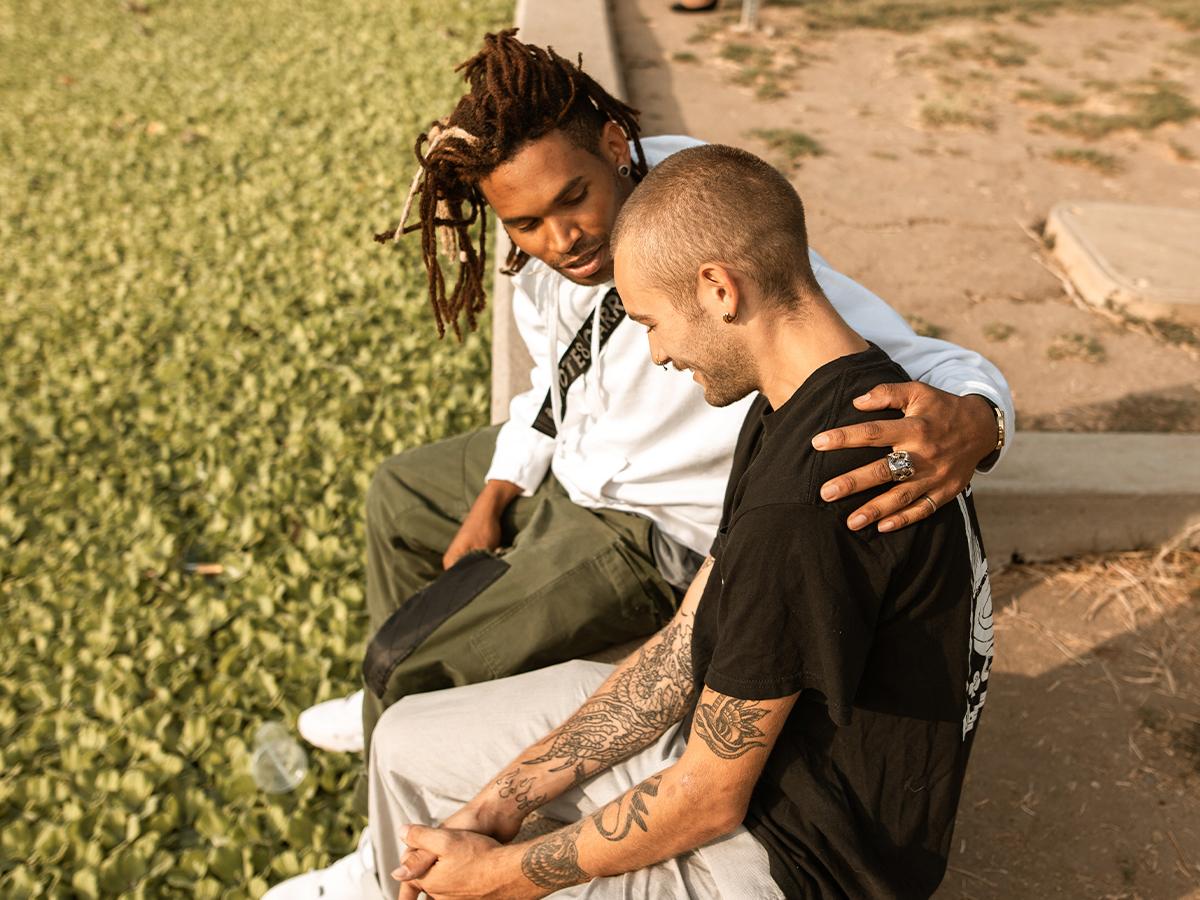
Published:
Readtime: 7 min
Every product is carefully selected by our editors and experts. If you buy from a link, we may earn a commission. Learn more. For more information on how we test products, click here.
Have you ever stopped and considered how strange it is that when guys get into fights at school, no one stops and asks if everything is ok? Yet, if someone cries, they all start to question what’s going on. This disconnect reflects how anger is often society’s only accepted mechanism for men to experience emotions. But it doesn’t have to be that way. If we’re able to remove the shame, the judgement and the stereotypes, men can open up.
A lot of people struggle to talk about what they’re going through and how they feel, especially men. Where toxic masculinity still exists, men are taught not to try and experience their emotions, which translates into intergenerational feelings of shame and loneliness. I recently sat down with Tal, a facilitator with The Man Cave, an organisation that teaches students how to navigate and empower men to healthily express their identity, to talk about the importance of opening up and how to approach it with your mates.

Why do men feel shame about sharing their emotions?
Speaking with Tal, I realised that men are very afraid and shameful about sharing their emotions. There is so much fear around opening up due to “all the stereotypes around us, that men are supposed to provide and men are supposed to be strong no matter what.” We have been constantly told as men to be strong and that emotions are weaknesses if they are expressed outside of anger.
This shame also comes about as a result of a hesitancy to bring up conversations and the fear of people not validating their emotions – or brushing over them. Tal explains it’s common that “a conversation gets sidetracked, so maybe a guy would share, and that subject will get changed quickly, so then the person doesn’t feel seen when they do share.” This can cause a level of fear and hesitation when trying to talk about emotions again.
So how can men get through the shame and open up?

1. Give your friend a heads up
Before talking to your friend about how you are feeling, it is important to give them a heads up so they don’t feel blindsided and can mentally prepare for a more serious chat. Tal suggests saying something like, “I just have something to talk to you about, I’m going through a bit and wanted to give you a heads up.” Asking your friend if they are okay with this allows you to know their listening capacity.

2. Speak to Someone You Trust
When opening up about your emotions, it is important to speak to someone you trust, like a friend, family member, or mentor. If you speak to someone you trust, you will feel safe enough to express your real raw emotions and opening up will actually just happen in a judgment free place.

3. Be Aware of Your Environment
One of the things that is commonly overlooked when speaking about how we feel is doing it in a safe environment, and what we like to call a container. Remember when you were at a sleepover as a kid and right before sleeping you’d talk about your secrets? That’s a container.
Some places can be your car, bedroom, or on a walk – just somewhere that you feel safe and secure. Tal says, “I have had some of the deepest and most vulnerable conversations in my life in my container, which is my car.” You don’t feel like anyone else is going to intrude, and you have the privacy to feel your emotions freely.

4. Taking that Leap of Faith
The most important part is actually taking that leap of faith. It can be scary and people are afraid they will bring the mood down, but it’s really you against you. Tal explains, “Sometimes going into something not knowing what you are going to say is the best way to be real about how you are feeling.” This allows for a spontaneous, honest conversation where emotions can be experienced and vocalised. Opening up is about our feelings not experiences and if we can speak to the feeling it can be a powerful release.
Sometimes we don’t know what to talk about, but if you speak about how you are feeling then usually you start to make sense of what is going on in your life and the issues you are facing.

5. Asking if Your Friend has Been Through Something Similar
Talking about your emotions can be very vulnerable. To feel less alone, you can ask the person speaking with if they have experienced anything similar. When opening up we can have thoughts of, what is this person thinking about now? Are they judging me? Am I weird? It can be helpful to ask your friend “what was this whole experience like for you?” This can allow them to share their experience and advice if needed.
How Important is it for Men to Open Up?
Opening up is important for everyone, regardless of gender or experience. The emotions we feel make up who we are, and often when we share those emotions with those closest to us, we feel lighter and less alone in our experience. By speaking about your emotions, you are able to feel seen and heard, which can be liberating. Things can make more sense when you open up and learn to have a deeper connection with yourself and those around you.
So do you have to share? Opening up isn’t for everyone, and you shouldn’t be pushed into it. It should come naturally – when you’re ready, you’ll share. It becomes toxic when you are purposefully keeping things out of fear, but if you don’t desire to share yet, that’s ok. It’s very hard for people to self soothe which is why community and opening up to trusted people can be effective mechanisms to deal with your emotions and experiences.
How Can Men Support Their Friends When and After They Open Up?
It’s so important, after your friend has spoken about their fears and emotions, to really be there to support them during this tough time. One of the most effective ways to showcase your support is listening. A lot of the time, most of us go directly into advice when we hear our friends struggling, but most of the time, we all know the right advice. Tal says that “most people know what they’re supposed to do” and when they are opening up all they want is to be heard and have someone validate them and say that what they are going through sucks. One way to find what your friend is looking for when opening up is asking the question:
Before We Get into This Chat, Do You Want Advice From Me or Do You Want Me to Just Listen?
It is important to allow the person talking to be cared about and heard, so follow up questions are really important. What’s that like? How did you feel when this happened? How are you going about things now? When you are asked these questions, subconsciously you think that the person cares.
It takes a lot of emotional energy to open up and for the other person to listen and hold space for the conversation. There is a lot of emotional energy on both sides. It is important for people to check in with their friends who have opened up about their feelings, but it’s important to do it in a safe environment. You can check in over text or in a private place a few days later.
Just remember to ask your friend, how are you going with everything?


































Comments
We love hearing from you. or to leave a comment.